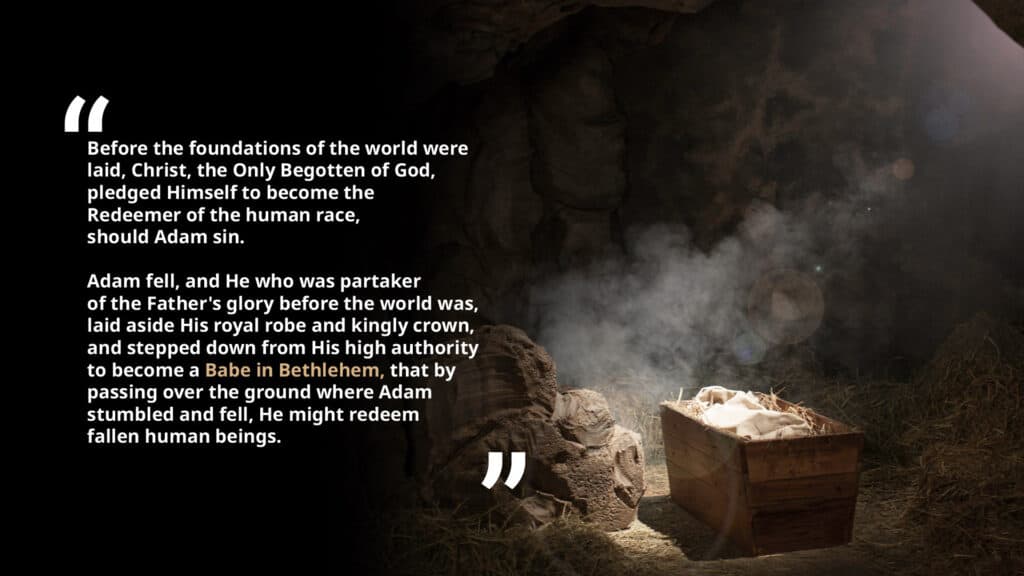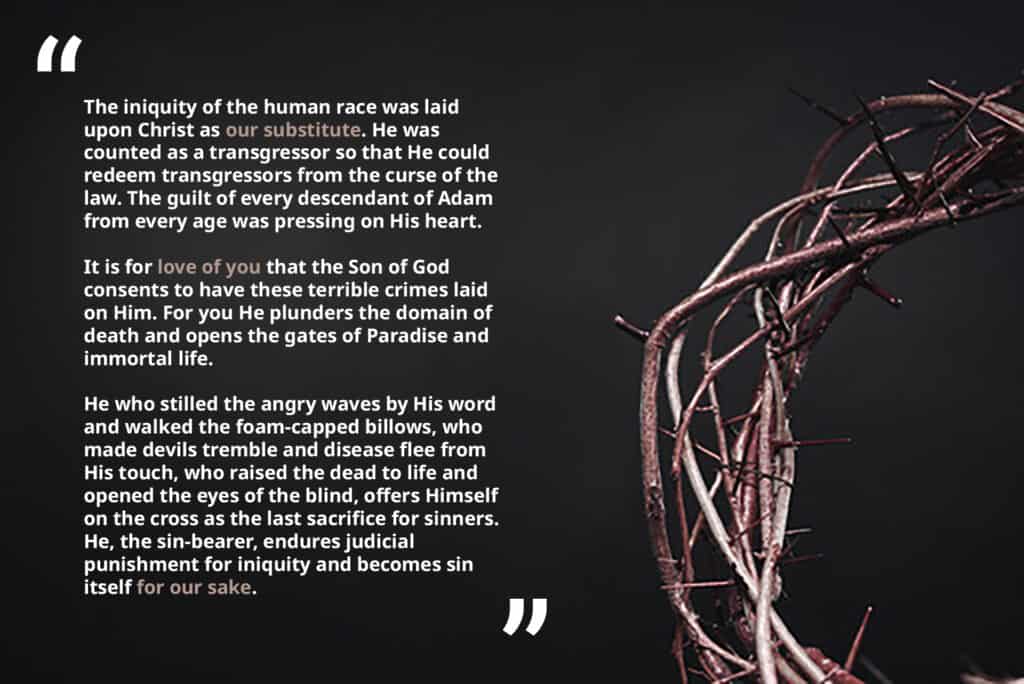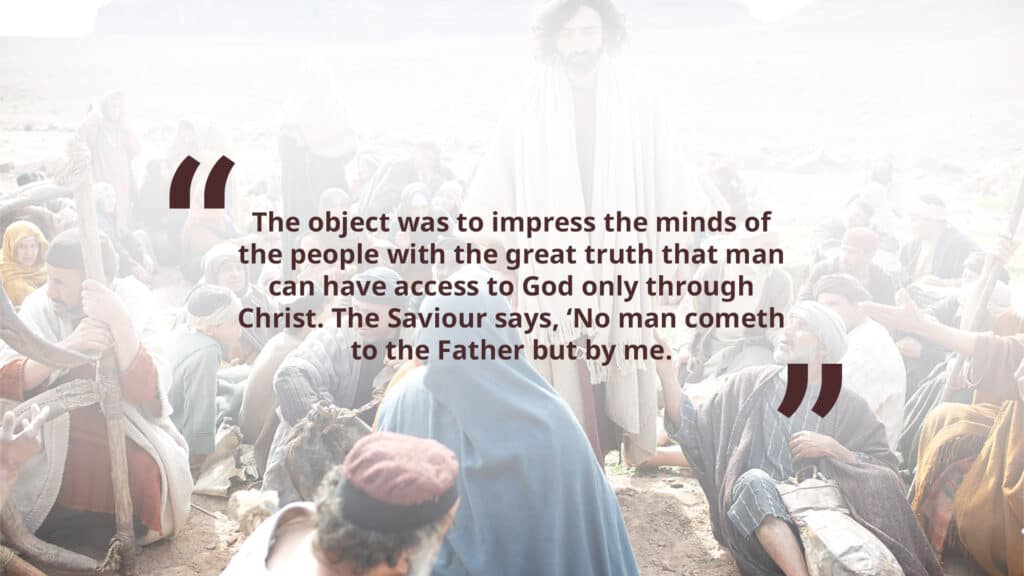Salvation has been the core theme of the Christian church, but it has also been one of the church’s primary struggles. Even during the time of the apostles, there were people who struggled with the concept of Christ’s free gift of salvation.

Ego is strong. People still feel a drive to achieve things for themselves. It can be easy to entertain the notion that somehow, by doing a lot of good things, we could make ourselves worthy enough to earn our way to heaven.
In the early days of the Seventh-day Adventist Church, many members respected the inspired counsel of Ellen G. White, a prominent co-founder of the denomination. She was a devout follower of Christ who sought to bring God’s biblical messages to the attention of her fellow Christians—messages of humility, peace, joy, and genuine concern for humanity.
Faith in Jesus Christ and His ultimate sacrifice was a key theme in her messages. During a time when churches especially struggled with the faith vs. works concept, she knew it was her duty to bring the focus back to our Savior as the only way to salvation.
We’ll take a closer look at her guidance regarding:
- Ellen White’s wisdom about Christ’s identity
- Christ’s role as our savior
- Jesus Christ as the only way to salvation
- How we can take this message to heart
Ellen White’s wisdom about Christ’s identity
“I am the way, and the truth, and the life. No one comes to the Father except through me” (John 14:6, ESV).

While quite the straightforward passage of Scripture, it’s one humanity keeps struggling with. Even as history progresses, sin makes “self” a persistent enemy.
That’s why we need a savior. That’s why we need Jesus. His sacrifice for our redemption was perfect, because He came to earth and lived as one of us. Christ’s identity, as fully God and fully human, is the reason His death sets us free from sin.
Wanting fellow believers to understand this more fully, Ellen White wrote:
From all eternity Christ was united with the Father, and when He took upon Himself human nature, He was still one with God. He is the link that unites God with humanity.
Forasmuch then as the children are partakers of flesh and blood, he also himself likewise took part of the same [Hebrews 2:14]. Only through Him can we become children of God. … Thus the heart becomes the temple of the living God.
It is because Christ took human nature that men and women become partakers of the divine nature. He brings life and immortality to light through the gospel.((White, Ellen G., Signs of the Times, August 2 issue, 1905 ))
She explained what it meant for Jesus to be both fully human and fully divine, how His sacrifice brought fallen humanity back to God, and what happens when we seek our salvation elsewhere.
Through it all, her writings point back to Scripture, emphasizing that the heart of the whole message is that Christ is the only one who can truly save us.
During Christ’s time on earth, many who met Him saw Him only as a “good teacher.” But few understood who Jesus truly was: a member of the Godhead in human flesh, who came down to rescue humanity from the mess sin had left them in.
She described it like this:
Before the foundations of the world were laid, Christ, the Only Begotten of God, pledged Himself to become the Redeemer of the human race, should Adam sin.
Adam fell, and He who was partaker of the Father’s glory before the world was, laid aside His royal robe and kingly crown, and stepped down from His high authority to become a Babe in Bethlehem, that by passing over the ground where Adam stumbled and fell, He might redeem fallen human beings.((White, Ellen G., Signs of the Times, August 2 issue, 1905 ))

Jesus, God’s only Son, left His place as king of the universe and took on a human body. Then He lived a sinless life so we might be saved through Him.
Jesus was 100% divine, one with God the Father and the Holy Spirit. And He was also 100% human, vulnerable to all the weaknesses we struggle with.
During His time on earth, Jesus lived just like any other man. He got hungry, He probably skinned His knee, and He felt anger and hurt and loss just like we all do. Every struggle and temptation we’ve gone through, Jesus also went through.
Ellen White felt it important to emphasize just how much Jesus “was sorely afflicted, and hard beset”((Ibid.)) by many temptations, and yet He conquered them all through His connection with His Father.
Why would Jesus subject Himself to all those terrible trials?
Why would someone literally powerful enough to control the entire universe choose to make Himself weak and vulnerable? Why would He put Himself in human skin to be mocked, mistreated, betrayed, and eventually crucified?
The answer is simple.
He loves us.
We are all flawed human beings with sin in our hearts. The book of Romans tells us that everyone is under sin:
There is no one righteous, not even one. There is no one who understands; there is no one who seeks God. All have turned away; all alike have become worthless. There is no one who does what is good, not even one.
Romans 3:10 (ESV)
Even when we mean to do good, our sinful nature gets in the way, making us selfish. That self-serving attitude makes us unfit for the pure goodness and love of God’s presence. That’s why Christ came to earth in order to mend the connection between the fallen creations and the perfect Creator.
Ellen White called Jesus “the link that unites God with humanity,”((Ibid. )) and she was right.
Jesus, being both God and man, was the only person who has ever walked this earth but never sinned. That is what makes Him qualified to unite us with God. Jesus’ entire identity was wrapped up in His mission to show the world who God is, and to take our sins upon Himself.
Want to learn more about Jesus and how He can help you find freedom, healing, and hope? Sign up for our free online Bible studies.
Emphasizing Christ’s role as Savior
Ellen White was so moved by the love of Jesus, and she knew the root of all the church’s beliefs must be on Him and what He did for all humanity. She wrote several pieces that were meant to remind fellow believers of the ultimate importance of Christ.
In Steps to Christ, Ellen White wrote about how Jesus acted out His role as an emissary for the human race long before He was ever born in Bethlehem.

She begins by telling the story of Jacob found in Genesis 28.
This young man, who had lied to his father and cheated his own family, was now fleeing from his brother Esau. He was racked with guilt and felt like an outcast who was cut off from everyone he loved.
He was sure God would never forgive him for his sins.
One night, while he lay sleeping, God sent him a dream, a vision of a ladder reaching all the way to heaven. Angels were climbing up and down, and at the top of the ladder was God Himself, seated on His throne. She describes exactly why this is so meaningful:
Thus was made known to Jacob that which met the need and longing of his soul—a Savior. With joy and gratitude he revealed a way by which he, a sinner, could be restored to communion with God. The mystic ladder of his dream represented Jesus, the only medium of communication between God and men.((White, Ellen G., Steps to Christ, p. 20 ))
Christ willingly took on His role as Savior so our relationship with God could be restored. He knew what it would cost Him. When He, a truly innocent man, was crucified back on Calvary, He felt the weight of all of our sins…and all the punishment that went with them. Christ’s pure being took on sin so that sinful human beings could be counted as pure.
The guilt of every descendant of Adam from every age was pressing on His heart. … It is for love of you that the Son of God consents to have these terrible crimes laid on Him. For you He plunders the domain of death and opens the gates of Paradise and immortal life.
He who stilled the angry waves by His word and walked the foam-capped billows, who made devils tremble and disease flee from His touch, who raised the dead to life and opened the eyes of the blind, offers Himself on the cross as the last sacrifice for sinners. He, the sin-bearer, endures judicial punishment for iniquity and becomes sin itself for our sake.((White, Ellen G., Story of Hope, p. 72 ))

She emphasized how Christ showed His love for us in the greatest way He could, by taking on the worst, most painful aspects of our lives and accepting the punishment for all of them so we wouldn’t have to.
When Christ was on the cross, the sin of the world weighed down on Him so much that He truly feared He would lose His connection with God forever. But He was willing to risk it—because if He didn’t, we’d all be lost.
That is the greatest and purest expression of love to ever exist.
We could never hope to repay Christ’s gift to us. We will forever be indebted to Christ’s love and selfless kindness. The only thing we can do is accept the gift of salvation He offered us on Calvary and return the boundless love He has for each of us.
Declaring Christ as the only way to salvation
Christ came to Earth as our savior, our one and only access to God the Father. And human history has made it painfully clear how desperately we need someone to save us.
Ever since mankind disobeyed God’s command in the Garden of Eden, the relationship between humans and God has been damaged. Human beings, in our sin-tainted natures, are unable to connect with a truly holy and divine God.
It is impossible for us, of ourselves, to escape from the pit of sin in which we are sunken. Our hearts are evil, and we cannot change them. “Who can bring a clean thing out of an unclean? Not one.” “The carnal mind is enmity against God: for it is not subject to the law of God, neither indeed can be.” [Job 14:4; Romans 8:7].((White, Ellen G., Steps to Christ, p. 18 ))
We are, by nature, flawed.
Flawed human beings can never attain perfection or reach God on their own.
This was the lesson God tried to teach the children of Israel while they wandered in the wilderness, using the sacrifices in the tabernacle to emphasize the point (Leviticus 17:1-9). The sin offerings the people brought had to be presented to the priests at the tabernacle, or they would not properly represent what they were supposed to. Anyone who tried to atone for his sins by offering a sacrifice to God on his own was to be “cut off” from the people. Ellen White explains the significance of this, saying:
The object was to impress the minds of the people with the great truth that man can have access to God only through Christ. The Saviour says, “No man cometh to the Father but by me.”((White, Ellen G., The Signs of the Times, Aug. 24 issue, 1891, par. 8))

It’s important to recognize how vital this is to the message of the gospel. The high priest in those roles represented Jesus, because Jesus had not yet set foot on earth. Now Jesus serves in that role. He is the only One who can save us. No other human being can.
We, in ourselves, can never be good enough for God. It just isn’t possible. If it were, we wouldn’t have needed Christ’s sacrifice.
The only way we can be considered righteous is through Christ’s gift of grace. Righteousness by works is a myth (though a common myth in her days). But all the good we can possibly do, our best deeds and intentions, count for nothing.
…Whatever prevents us from making Christ our entire dependence, is abomination in the sight of God. There is no hope for man but to cease his rebellion, his resistance of God’s will, and own himself a sinner ready to perish, and cast himself upon the mercy of God. We can be saved only through Christ. Not by any good works which we may do, can we find salvation.((Ibid., par. 9))
Christ is the only one who can save us. That’s the bottom line.
If we find ourselves turning to other things to make us holy, whether it be our financial status, the teachings of some charismatic speaker, or our quota of good deeds, we will find ourselves sorely mistaken.
The only holiness we can ever have comes from God through Jesus.
Taking it all to heart
Before sin ever came into our world, God had a plan to counteract it.
He sent us Christ, His only son, who became human so we might become holy. Christ serves as our gateway to the Father and is our only hope for eternal life in heaven.
Ellen White knew that this was something we should never forget…and that we might need to be reminded of from time to time.
Even though her writings were published more than a hundred years ago, her words are timeless. They show us the urgency of the Gospel message and encourage us to study His Word, so we can be prepared for Christ’s Second Coming.
Want to learn more about the free gift of salvation and how it can be yours through Jesus Christ? Start your own online Bible study.
